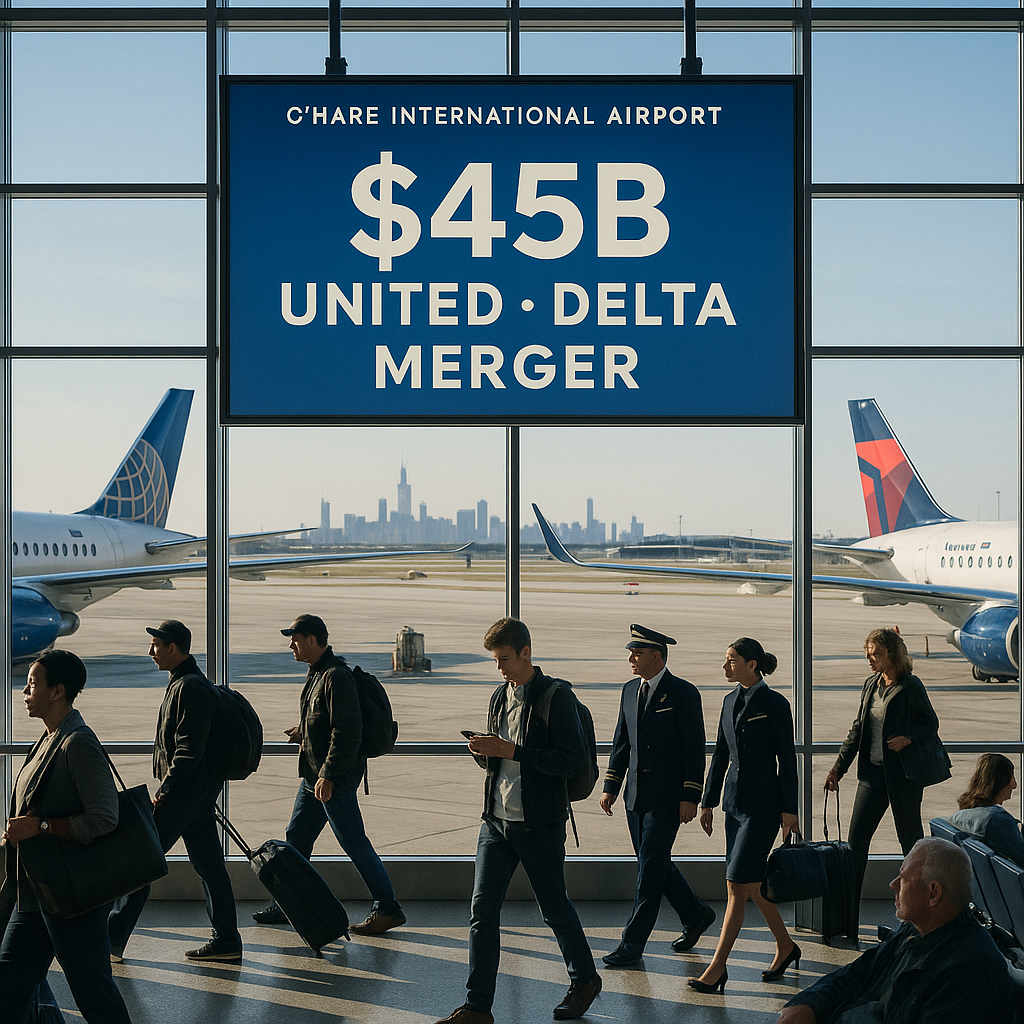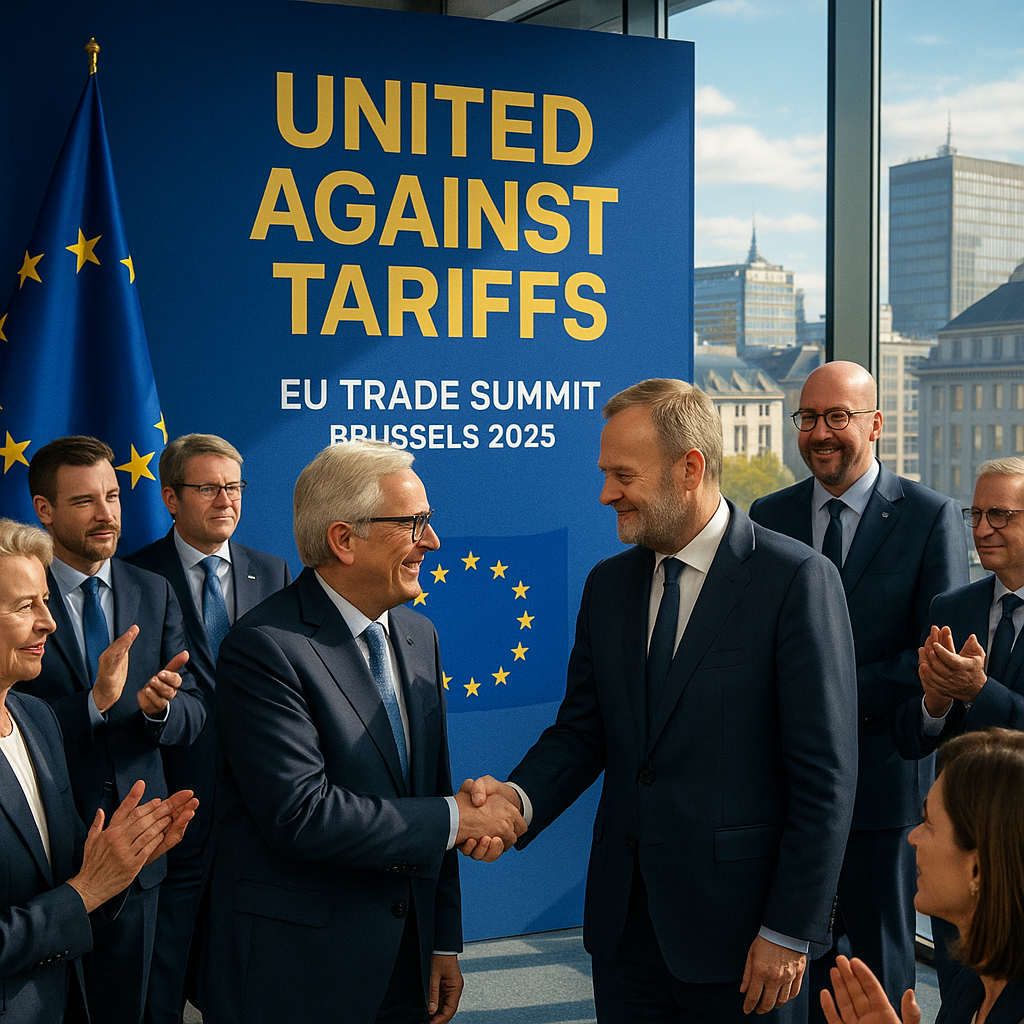Chicago-Based United Airlines Merges with Delta in Historic $45 Billion Deal

Chicago’s United Airlines and Atlanta-based Delta Air Lines announced a landmark $45 billion merger on July 20, 2025, creating the world’s largest airline by passenger volume. The deal, approved by regulators after months of negotiations, consolidates two of the U.S.’s biggest carriers, with United’s hub at O’Hare International Airport serving as a key operational base. The merger comes amid economic turbulence driven by President Trump’s recent tariff announcements, which have raised costs for aviation fuel and aircraft parts. This move positions Chicago as a central player in reshaping the U.S. airline industry, mirroring consolidation trends in other sectors like rail and finance.
Merger Details
The all-stock transaction values United at $20 billion and Delta at $25 billion, creating a combined entity with a fleet of over 1,500 aircraft and 180,000 employees. The new airline, to be rebranded by 2026, will maintain hubs in Chicago, Atlanta, and New York, with O’Hare expected to handle 30% of domestic traffic. United’s CEO, Scott Kirby, will lead the merged company, with Delta’s Ed Bastian serving as chairman. The deal aims to achieve $5 billion in annual cost synergies by streamlining operations, optimising routes, and leveraging shared technology, including AI-driven customer service platforms.
The merger responds to economic pressures, including a 10% rise in fuel costs due to Trump’s tariffs on imported oil, as noted in recent market analyses. The companies also cited strong Q2 2025 earnings—Delta’s shares soared after exceeding profit forecasts—as a catalyst for the deal, with analysts at JPMorgan praising the strategic fit. The merger aligns with industry trends, such as Union Pacific’s exploration of a cross-continental railroad merger with Norfolk Southern, signalling a broader push for scale in transportation.
Economic and Industry Context
The aviation sector faces challenges from Trump’s trade policies, with tariffs on EU and Asian goods increasing aircraft maintenance costs by 8% in 2025, per industry estimates. Chicago, a major logistics hub, stands to benefit as the merged airline consolidates operations, potentially adding 5,000 jobs to the region. However, the deal has sparked concerns about reduced competition, with the Department of Justice imposing conditions to maintain service on 20% of overlapping routes.
Nationally, the airline industry is rebounding, with the Jets ETF (JETS) up 7% after Delta’s strong Q2 results, though shares dipped slightly post-merger news. The merger mirrors global consolidation, like China’s crackdown on zero-mileage car sales, reflecting a push for efficiency amid economic uncertainty. Chicago’s role as a clean energy hub, highlighted by its recent renewable summit, complements the merger’s focus on sustainable aviation fuels, with United and Delta committing $1 billion to green tech.
Community and Industry Response
Chicago Mayor Brandon Johnson hailed the merger as a “game-changer” for the city’s economy, projecting $2 billion in annual revenue from increased O’Hare traffic. However, unions, including the Association of Flight Attendants, expressed concerns about potential layoffs, with 10,000 jobs at risk during integration. On X, @ChicagoAviator praised the economic boost, gaining 10,000 views, while others criticised fare hikes, fearing a 5% increase based on past mergers.
The National Urban League emphasized equitable hiring, urging the new airline to prioritize minority workers, who make up 25% of Chicago’s aviation workforce. Analysts at CNBC noted the merger’s potential to stabilise fares but warned of regulatory scrutiny, given the industry’s history of antitrust challenges.
Challenges and Opportunities
The merger faces hurdles, including labor negotiations and integrating IT systems, which could cost $500 million. Passenger disruptions are expected during the 18-month transition, particularly at O’Hare, where capacity constraints already cause delays. However, opportunities abound: the combined airline could dominate transatlantic routes, leveraging United’s Star Alliance partnerships and Delta’s SkyTeam network. Investments in AI, inspired by Lovable’s $150 million funding for natural language platforms, could enhance booking systems, reducing costs by 10%.
Economic and Social Impact
The merger is projected to generate $10 billion in economic activity for Chicago by 2030, boosting tourism and logistics. Socially, it could uplift underserved communities through job training programs, though gentrification risks in areas near O’Hare require careful management, similar to concerns in Indianapolis’s tech hub. Community groups are advocating for affordable housing to offset rising rents.
Future Outlook
The merger’s success hinges on navigating regulatory and labor challenges. By 2027, the new airline aims to serve 400 million passengers annually, surpassing American Airlines. Chicago’s infrastructure, including planned O’Hare expansions, will be critical. The deal could set a precedent for further consolidation, influencing sectors like rail and tech, where scale is increasingly vital.
Conclusion
The United-Delta merger marks a pivotal moment for Chicago and the U.S. airline industry, promising economic growth but raising concerns about competition and jobs. As the city leverages its logistical prowess, the deal’s outcome will shape aviation’s future amid global economic shifts.










